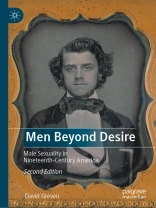This book explores the construction of male sexuality in nineteenth-century American literature and overturns longstanding views. Far from desiring heterosexual sex and wishing to bond with other men through fraternity, the male protagonists of classic American literature mainly want to be left alone. Greven makes the claim that American men, eschewing both marriage and male friendship, strive to remain emotionally and sexually inviolate. Examining the work of traditional authors – Hawthorne, Poe, Melville, Cooper, Irving, Stowe – Greven discovers consistently resistant portrayals of male characters who defend their individuality through a lockdown on sexuality. Objects of desire from both women and other men, the inviolate males discussed in this study disrupt established gendered and sexual categories, inspiring fresh analysis of the era and its literary depiction of American manhood.
This second edition of Men Beyond Desire (2005) expands the analysis of male sexuality to include discussions of developments in the field of masculinity studies. It includes a new introduction that introduces the complementary figure of the “victim-monster” and revisits the work of Leslie Fiedler, and a new chapter that focuses on Melville’s tale ‘Bartleby the Scrivener’ (1856). Chapter 4 expands the analysis of the intersections among free love, health reform, and male sexuality in The Blithedale Romance (1852), and chapter 9 expands the discussion of Billy Budd, Sailor to address questions of race and the role of the Handsome Sailor.
สารบัญ
Ch 1: Introduction.- Ch 2: Troubling Our Heads about Ichabod: ‘The Legend of Sleepy Hollow, ‘ Classic American Literature, and the Sexual Politics of Homosocial Brotherhood.- Ch 3: Fear of Fanshawe: Intransigence, Desire, and Scholarship in Hawthorne’s First Published Novel.- Ch 4: Disturbing the Sleep of Bachelors: Natty Bumppo’s Brushes with Desire.- Ch 5: ‘Madman!’: Part One: Madness and Manhood in Hawthorne’s The Scarlet Letter and The Blithedale Romance.- Ch 6: ‘Madman!’: Part Two: Madness and Manhood in Poe’s ‘The Fall of the House of Usher’.- Ch 7: Melville’s ‘Bartleby the Scrivener’.- Ch 8: ‘Bound in Black Morocco’: Manhood and Enchantment in Uncle Tom’s Cabin.- Ch 9: The Afterlife of Uncle Tom’s Cabin.- Ch 10: The Angel Must Hang: Billy Budd, Sailor, Compulsory Homosociality, and the Handsome Sailor.- Ch 11: Coda: Billy’s Fist.
เกี่ยวกับผู้แต่ง
David Greven is Professor of English at the University of South Carolina, USA. His books include All the Devils Are Here: American Romanticism and Literary Influence (2024), Ghost Faces: Hollywood and Post-Millennial Masculinity (2016), Gender Protest and Same-Sex Desire in Antebellum American Literature: Margaret Fuller, Edgar Allan Poe, Nathaniel Hawthorne, and Herman Melville (2016), and The Fragility of Manhood: Hawthorne, Freud, and the Politics of Gender (2012).












